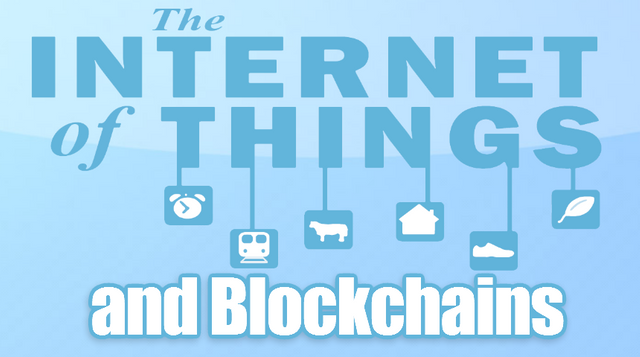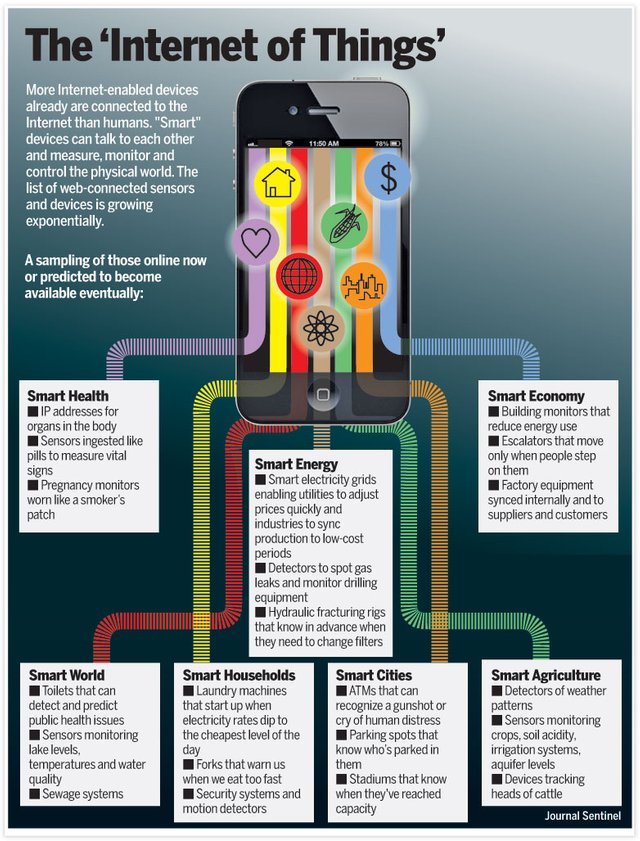How Blockchain Technology Can Help The Internet Of Things
How can we solve most of the IoT (Internet of Things) critical problems with blockchain technology?
Initially, people think that Bitcoin and cryptocurrencies are for financial applications, but we already have some early examples of applications that are non-financial.
Some of these are domain name registries, land titles, and global identity systems, however, a new breed of technology is emerging.
These technologies will be taking advantage of transaction messaging, decentralization of communication and military-grade encryption which is very important for the industrial internet and the internet of things in general.

First, let's dispel some myths.
Although there are many blockchains out there, I'm going to speak specifically to the most popular one which is Bitcoin.
Some people believe that Bitcoin transactions are slow, taking 10 minutes to inscribe on the chain, so how could you use this technology for the IoT?
So let's dispel the first myth.
Across 55% of the network in the entire world, transactions take on average 400 milliseconds, so sending information between two end nodes is rather quick across this network. Across the majority of the network, it's less than 2 seconds. This is separating the actual sending of the message with inscribing the message on the blockchain.
When it comes to inscribing on the blockchain, it's incredibly fast if we consider how we would use the blockchain inscription for governance and the regulatory authorities.
Regulators will ask you for information dating back a month or a year, for example, but they're never going to ask you for information created in the last five minutes.
This is also very fast if you have assets and you want to track chain of custody from one individual to another individual.
Why use blockchain technology?
Why would we use the blockchain for the IoT if there's already preexisting technology to solve this problem?
The first reason is proven cryptographic signing capability.
As products proliferate on the internet we get hackers. We now have a proven technology that protects $16-billion worth of value on Bitcoin and no government or hacker has been able to penetrate it. How comfortable would your company be if you knew the same technology was protecting your devices and computer systems?
Secondly, is the ability to communicate peer-to-peer between devices and that is already built into this technology and infrastructure.
Thirdly, is asset based functionality. The IoT can reinvent how a devices physical assets function because we can provide, through digital assets, metering capabilities of keys that expire in time directly through hardware and equipment and that's a significant game changer in rentals, leasing, and many other industries.
And as I've mentioned governance. So when you start thinking about these things you start realizing that blockchain shouldn't be foreign for industry and the IoT.
And of course, custodial tracking of asset transmissions which is also rather important if you're dealing with global logistics.
These are the five bullet points to the challenges to industrial and IoT that exist today.
How will industries...
- Connect 50 billion devices by 2020?
- Create controls for vast numbers of devices?
- Enable peer-to-peer communications between globally distributed devices?
- Provide compliance and governance for all autonomous systems?
- Address the security complexities of the new landscape that is emerging?
Let's look at each of these questions one by one.
How will industries connect 50 billion devices by 2020?
There's an estimated 2^63 grains of sand on Earth. Blockchain addresses can store 2^160 addresses in them so we can have many planets worth of grains of sand registered as device end nodes, but most importantly is that we don't have to look through a database of billions of records to find that device. Those devices are directly addressable, one device can send information directly to another device.
This gives us limitless registration of devices, 50-billion or even a trillion are easily handle by blockchain technology.
How do you create controls for vast numbers of devices?
Blockchain also makes this easy. Why? Because just like a device can be an end node, so can a supercomputer or a system that sends a cryptographically signed message to that device that no hacker can do a man-in-the-middle attack or penetration on.
Now we can send signals from a central location to a device that's decentralized speaking to other devices.
With blockchain technology, it becomes natural because the blockchain provides peer-to-peer connectivity between these addresses in a natural fashion. So it becomes very simple to implement.
We can directly send and receive not only communication but assets that represent anything you'd like it to represent, any physical or digital item or good.
How will industry provide compliance and governance for all autonomous systems?
Autonomous systems are what we refer to as smart contracts in the blockchain space. So how do we provide compliance?
What is better than an immutable ledger?
When we enter communication information or transfer of assets in and immutable ledger, a ledger that can't be broken, you have the best governance and compliance in the world.
How will industries address the security complexities for a new landscape that is emerging?
Major companies are scratching their heads asking themselves how they're going to deal with the security complexities of a landscape with so many devices and security holes.
The answer becomes simple and that is that Bitcoin has proven over the years that it can do one thing extremely well. And that is it can prove that whoever sent you a coin, and in this case, it would be a message, could have only come from the originator.
With ECDSA (Elliptic Curve Digital Signature Algorithm) message signing and cryptographic message verification, you have the strongest military-type communication security in the world for all of your devices.

Let's talk about the advantages of the internet of things.
First, we have a free global infrastructure that we can leverage. This infrastructure of the blockchain is a massive infrastructure, not only that we leverage, but we can rely on it.
Secondly, all of this data really lives on the edge, the last mile to the device, so blockchains are being replicated constantly and consistently to every single node as close to your user as possible.
Think about the advantages and cost savings of that compared to if you had to build that type of infrastructure yourself.
Third, we have hack-proof cryptography eliminating attack vectors such as man-in-the-middle attacks and other types of attacks that have been attempted in the last few years when dealing with IoT or industrial internet devices.
If you're a company and you're looking to protect a power grid or high-value assets, it becomes a natural to use blockchain technology.
Fourth, we could record proof of life or assets in an irreversible ledger.
For example, a Rolex watch made by the Rolex company could be registered on a blockchain making that asset always able to verify its validity, increasing revenue for the company by eliminating counterfeiting because we can now verify on the ledger the genuine article.
We can verify the genuine parts for a vehicle or industrial equipment. The advantages are immense in this space.
We can track chain-of-custody on transfer and sale. So not only can we register these genuine articles or parts, but when can know when they are sold to another individual, allowing us to gain the types of metrics that a company would lose after they manufacture a part and it leaves their control.
Now we can provide insight to companies that never had that insight because after the first sale they may lose the insight and metrics that they need to understand how subsequent markets for their parts are used.
Device to device event triggering based on real world logistics.
Now, we can actually send a message to a device based on occurrences that happen autonomously via smart contracts or smart assets as they exist and devices can communicate with each other, giving a major advantage to the use of the internet of things.
Full redundancy providing 100% up-time and assuring message delivery.
That's a very large statement for anyone to claim. Very few technologies can prove that and we can with blockchain technology.
Indisputable governance.
No one can dispute what occurred in a company or organization so we can eliminate fraud or waste and increase revenue for a company.
Conclusions
Devices can act autonomously on a global scale, listening, recording, and triggering events and we're not limited to a small network and we don't have to invest hundreds of millions of dollars to trigger these events. In triggering these events across the planet we don't have to worry about security if it is implemented correctly.
Blockchain has the potential to become the only affordable way to implement millions upon millions of systems worldwide. Leveraging blockchain technology, a company can gain all of these advantages.
Related Posts
Programmable Trust For The Internet Of Things How Bitcoin Is Transforming The Way We Do Business
Bitcoin Vs Banks Technological Disruption Can Revolutionize Banking
Five Ways Smart Contracts On A Blockchain Are Changing The Way We Do Business
Blockchain Is Killing The Middleman Real Trust In A Virtual World
Today I Learned More About Bitcoin And Blockchain Technology

Hi @luzcypher
Interesting post...resteemed...i wrote a few tutorials about blockchain, bitcoin and iot...thanks for this post
Thanks for resteeming and reading my post.
Brilliant..!!!
A lot of time and effort too.. thanks.
Blockchain is the Ubiquity and Perpetuity of human generated value
It's a game changer that has the potential to reshape our societal interactions
Very interesting idea. A potential downside that strikes me is that an IoT blockchain could be even more vulnerable to a Sybil attack than a blockchain of more monolithic and varied devices. Especially at the first stages when the blockchain is initialised. What do you think?
By monolithic do you mean centralized?
The decentralized nature of the blockchain makes it less susceptible to attacks, not more susceptible. Any node that could be attacked would simply be routed around to another node.
What about the Sybil type attack though? I wasn't super clear I think, I didn't mean centralized, I meant more standard, complex systems, which are by and large more secure. IoT devices are notoriously less secure, so can be "owned" more easily by an attacker, and cheaper to deploy many of them if your aim was to control more nodes to do such an attack. I'm not super up on the terminology, but I guess that is also known as a 51% attack right?
Decentralized systems have different vulnerabilities, less for sure, but still some viable attacks exist. Ethereum was recently successfully attacked for example.
Sounds like you know a lot more about it than I do. I'll have to do some more research.
And me. Looking forward to your next article.